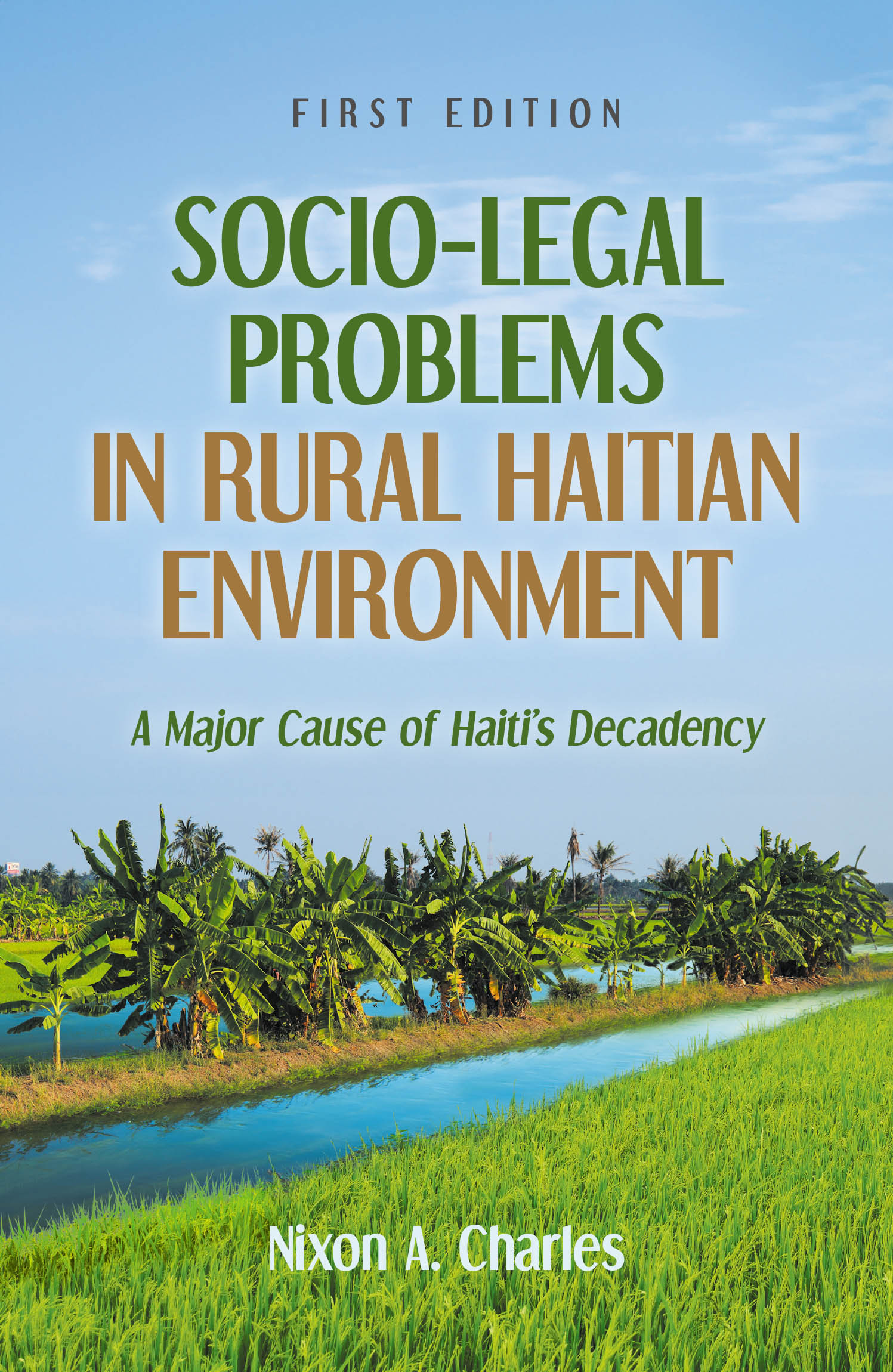Author Nixon A. Charles’s New Book, "Socio-Legal Problems in Rural Haitian Environment: A Major Cause of Haiti's Decadency," Explores the Ongoing Issues in Rural Haiti
Recent release “Socio-Legal Problems in Rural Haitian Environment: A Major Cause of Haiti's Decadency” from Hawes & Jenkins Publishing author Nixon A. Charles delves into the complexities of Haiti's agricultural sector, analyzing the systemic issues contributing to agricultural self-insufficiency and food insecurity.

Coconut Creek, FL, June 11, 2024 --(PR.com)-- Nixon A. Charles, holds an MBA from Nova Southeastern University, a bachelor of law from the State University of Haiti, and a BS in International Management from the American College of Switzerland, has completed his new book, “Socio-Legal Problems in Rural Haitian Environment: A Major Cause of Haiti's Decadency”: a comprehensive examination of the challenges plaguing Haiti's agricultural sector, drawing on historical context and contemporary analysis to offer insight into the root causes and propose solutions to revitalize Haiti's economy and address the challenges facing rural communities.
Author Nixon A. Charles is a professional with experience in various fields such as management, teaching, and real estate In Haiti, he worked at the Ministry of National Education for nearly ten years but abandoned the runoff of a legislative election because of gross irregularities and illegitimate maneuvers orchestrated by the Haitian administration of the time. At the end of the nineties, he was the spokesman of a group of executives and employees of the Ministry of National Education who, after intense and lively negotiations, led the Haitian government to understand the need to create and to contribute to the very first health insurance program for all employees of the Haitian public administration. He is a founding member of the Cooperative d’Epargne et de Credit, which produces financial services to thousands of stakeholders in Petite-Rivière de l’Artibonite. The author currently lives in Florida where he teaches math and provides consultation in the financial field.
“Since the triumph of a revolution against the fiercest colonialism and the most outrageous exploitation of France in 1804, Haiti has always made farming the basis of its economy to the point that Haitian legislator has always sought to create a legal framework to harmonize the relations between the different actors who intervene in this sector,” writes Nixon. “However, despite the fertility of its agricultural space, the robustness and vitality of its peasantry, Haiti is increasingly facing agricultural self-insufficiency, food insecurity, and famine.
“In this book, the author explains the causes of this paradox and proposes—after a systematic analysis of the phenomenon, including the most perverse behavior of Haitian elites on the political, social, and economic levels more especially during the last four decades—ways and means to enable Haiti to revitalize the key sector of its economy.”
Published by Hawes & Jenkins Publishing, Nixon A. Charles’s engaging read is a timely and vital contribution to the ongoing discourse on agricultural development and economic revitalization in Haiti. Through “Socio-Legal Problems in Rural Haitian Environment”, Nixon delivers a rigorous analysis and pragmatic approach that offers the valuable insights of policymakers, scholars, and practitioners into the complex dynamics shaping Haiti's rural landscape, while also providing actionable recommendations for sustainable change.
Readers who wish to experience this enlightening work can purchase "Socio-Legal Problems in Rural Haitian Environment: A Major Cause of Haiti's Decadency" at bookstores everywhere, or online at the Apple iTunes Store, Amazon, Google Play, or Barnes and Noble.
For additional information or media inquiries, contact Hawes & Jenkins at 888-430-7450.
Author Nixon A. Charles is a professional with experience in various fields such as management, teaching, and real estate In Haiti, he worked at the Ministry of National Education for nearly ten years but abandoned the runoff of a legislative election because of gross irregularities and illegitimate maneuvers orchestrated by the Haitian administration of the time. At the end of the nineties, he was the spokesman of a group of executives and employees of the Ministry of National Education who, after intense and lively negotiations, led the Haitian government to understand the need to create and to contribute to the very first health insurance program for all employees of the Haitian public administration. He is a founding member of the Cooperative d’Epargne et de Credit, which produces financial services to thousands of stakeholders in Petite-Rivière de l’Artibonite. The author currently lives in Florida where he teaches math and provides consultation in the financial field.
“Since the triumph of a revolution against the fiercest colonialism and the most outrageous exploitation of France in 1804, Haiti has always made farming the basis of its economy to the point that Haitian legislator has always sought to create a legal framework to harmonize the relations between the different actors who intervene in this sector,” writes Nixon. “However, despite the fertility of its agricultural space, the robustness and vitality of its peasantry, Haiti is increasingly facing agricultural self-insufficiency, food insecurity, and famine.
“In this book, the author explains the causes of this paradox and proposes—after a systematic analysis of the phenomenon, including the most perverse behavior of Haitian elites on the political, social, and economic levels more especially during the last four decades—ways and means to enable Haiti to revitalize the key sector of its economy.”
Published by Hawes & Jenkins Publishing, Nixon A. Charles’s engaging read is a timely and vital contribution to the ongoing discourse on agricultural development and economic revitalization in Haiti. Through “Socio-Legal Problems in Rural Haitian Environment”, Nixon delivers a rigorous analysis and pragmatic approach that offers the valuable insights of policymakers, scholars, and practitioners into the complex dynamics shaping Haiti's rural landscape, while also providing actionable recommendations for sustainable change.
Readers who wish to experience this enlightening work can purchase "Socio-Legal Problems in Rural Haitian Environment: A Major Cause of Haiti's Decadency" at bookstores everywhere, or online at the Apple iTunes Store, Amazon, Google Play, or Barnes and Noble.
For additional information or media inquiries, contact Hawes & Jenkins at 888-430-7450.
Contact
Hawes and Jenkins Publishing
Media Department
888-430-7450
www.hawesjenkins.com
Media Department
888-430-7450
www.hawesjenkins.com
Categories
